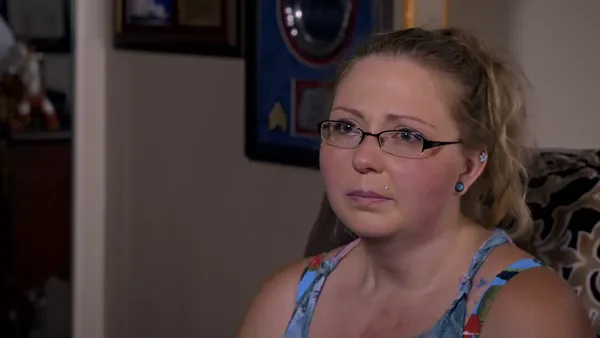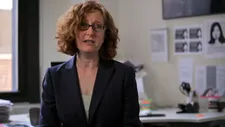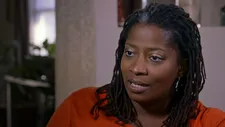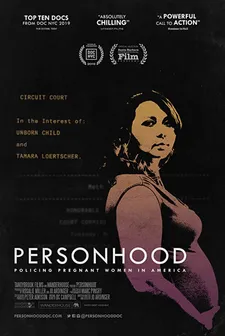 |
| Tammy Loertscher in Personhood: Policing Pregnant Women In America |
Did you know that in the US today, people who have every intention of keeping their pregnancies and raising their children can find themselves thrown into prison for perceived failures to behave the way a court thinks women should? Or that charges have been brought, in recent years, against women who have had miscarriages? Jo Ardinger’s new documentary, Personhood, looks at the political movement behind these laws, their implications for women’s rights more widely, and the impact they have had on individuals. It began, she says, almost by accident.
“ I'm an editor by trade. I really wanted to make my own film. And I learned about the foetal personhood movement and had never heard about it before. I learned about it from a news segment. I was watching Rachel Maddow and there was a personhood amendment in Mississippi, and I just was really floored by the fact that a state could try to change their constitution to add fertilised eggs, embryos, and foetuses. What that meant for pregnant people, was pretty alarming.”
 |
| Personhood |
It’s such a big subject that it took her a while to find the core of her story.
“These laws have such wide implications affecting everything from embryonic stem cell research, you know, to in vitro fertilisation and abortion, and I was kind of going down that route, and what it would mean to people to have an absolute ban on abortion with no exceptions. But then I started uncovering these articles that talked about the criminalisation of pregnant people, really crazy stories, like a woman who had fallen down the stairs and was sent to jail because someone deemed that it was a suspicious miscarriage - perhaps she had, you know, wanted to do this. She was let out after everything was settled, but the trauma, you know, the trauma had already occurred. And I read case after case like this, and I felt that that was the story I really wanted to lift up, because there's a lot of incredible filmmaking and stories about the issue of abortion.”
Much of the film is built around the story of one woman, Tammy Loertscher from Wisconsin, who unexpectedly found herself in trouble after she told her doctor about drugs she had taken to help her manage pain before she had discovered she was pregnant. I ask how Jo found her.
“I connected with Tammy a few years into production,” she says. “I had been connected with National Advocates for Pregnant Women, and they work with people all over the country who gets swept up in these laws. And they had started working with Tammy. And so they connected up. And Tammy was gracious enough to have a phone call with me and talk to me about what my goals for the fill were and what she wanted, which was to create something that would prevent this from happening to other people. And so once she was on board, we filmed her for several years.
“We were so fortunate because Tammy is such an open, honest person. And she knew after a time that she could trust us, you know. It takes a while when your trust has been ripped away from you. She trusted us to tell her story and she was so forthright, but I could see that trauma even, you know, a year later, two years later, when we would get together and kind of dredge this up to talk about it in subsequent interviews. And it really gave this front row seat to the lasting, trauma and stigmatisation that comes along with what happens to people under these laws.”
On top of everything else, Tammy found herself attacked in the media, presented as an image of bad motherhood when she seems like the opposite of that.
“Absolutely. I mean, the first time we filmed was when she had just recently given birth, and there was a huge write up in the Rolling Stone. ‘It was a great article,’ she said, ‘but then I made the mistake of looking at the comments.’ And people are very cruel and very judgmental, and they have these snap reactions without really taking a dive into the subject matter. And that was another reason why I think this film is so important: we're trying to make a case for what's actually healthy for a pregnancy, which is not to throw someone in jail, which is an extremely dangerous place for any human being. But if if somebody is having health issues, they need medical treatment. They, if someone's having an issue with drug use, they need to have treatment for that, they don't need to be thrown in jail. And the United States has a huge history of trying to solve our medical and social ills with prison.”
I ask Jo if she thinks that media narratives have contributed to creating a political climate in which laws like these can be passed.
 |
| Personhood |
“I think what happens is, there's one narrative right now that we tell and it's usually about abortion. And that's very much a binary argument. But what we really need to do is start talking about this issue differently, and we need to talk about [the fact] that this is not just about abortion, that the impacts of these anti abortion policies just ripple out into the lives of people who have no intention of ending their pregnancies.
“So I think the media bears a responsibility in trying to do full reporting on this, and to tease out some of the other issues. And there are incredible outlets there that are doing that, but we need to read about the stories in mainstream media and have them not only happen when there's a really crazy case, like, you know, a year ago when, when a woman who had been shot while pregnant, in Alabama, she was actually the person who got sent to jail because the prosecutor deemed that her behaviour in getting in an argument with someone in a store caused her to lose her pregnancy, caused her to be shot.
“The person who did the shooting didn't get charges. And so, of course, there was an outrage. And of course, there was this pressure. And thankfully, those charges were later dropped. But we need to have a kind of reporting going on on the regular so that we're doing more of these deep dives, and, you know, showing that this kind of thing can happen to people who identify, as, you know, anti abortion, people who identify as pro life. There have been many women who have been swept up in US laws.”
Does she feel that the public is unaware of the scale of this because only the more sensational cases make the news?
“Yes, hundreds of women. Even in Wisconsin, you know, this law is still being applied. It depends on where you live. And since the film has been out, women have been affected or impacted by this law. We just don't know the outcome, because it's all done in secrecy. So we're not really sure how those cases resolved, but we can find out how many of those cases were being looked at under this law. And there are other impacts, you know, women who show up at Catholic Hospitals in the middle of a miscarriage, if there's still a foetal heartbeat, they get sent home. And that can be a life threatening situation. There's just so many ways that these philosophies get pulled into healthcare. And you know, it's very, very dangerous.”
How did she go about connecting with people on the other side of the argument and getting them to explain why they support these laws?
“I just gave a call,” she says. “I said I was making a documentary about the foetal personhood movement and I wanted to be able to give people a real understanding on both sides of the argument. They were very gracious. This was a chance for them to say what their mission was, you know, and why they’re going to keep doing this till the day they die.
“Now, the personhood movement is focusing on changing laws in municipalities as opposed to states, starting local. So that's a pretty frightening thing, that it's not only the state where you live, but depending on the municipality, where you live, what kind of laws they're trying to pass. And it's not something that's going away soon. It doesn't matter that our administration has just changed. States are really trying to make moves against access to abortion because of the makeup now of our Supreme Court, which is very conservative.
 |
| Personhood poster |
“But of course, then there's always the challenges. And so for someone like in Tammy’s case, you know, that's the state of Wisconsin, and we know that these laws aren't applied evenly throughout the state. It depends on what the county judges are, what the county prosecutors are, who the DEA is. So, you know, in Tammy's case, she filed a suit against the state of Wisconsin saying that this was unconstitutional. But the case dragged on so long, that by the time there was a decision, you know, her child was already a couple of years old. And so they basically made a case that it didn't apply to her anymore.
They create a scenario where there's just never a viable chance for you to challenge it. So these laws get passed, and they get caught up in challenges. But in the meantime, people's lives are being affected.”
I mention the concerns that poor people and people of colour face a higher risk of being targeted.
“Yeah, with all of the other aspects of our criminal justice system, people who are traditionally marginalised, lower income people, people of colour, these are the these are the folks that are being targeted, more specifically, by these laws. And, you know, this isn't happening to middle class white women in their private practice, when they go to visit a doctor for a prenatal visit.
“For someone like Tammy, she was just admitting to preconception occasional drug use, that she was self medicating, not even something that she was currently doing. But because she was already someone who didn't really have a wide support system, she was already on the radar of the state. And so, you know, this is how people get caught up. She had gone to seek help. They said, ‘Hey, get to the hospital and talk to them.’ And this process got started behind the scenes. And so that's how people are getting swept up. And thank goodness for organisations like National Advocates for Pregnant Women who come in and try to help arrange legal care, to try to help people who are ensnared in all this.”
There was just time for Personhood to screen a few times before cinemas were closed due to the pandemic, and Jo tells me that audiences had a strong reaction to it.
“It was so incredible to be sitting there and hearing people react collectively, gasping at certain things that happened, as Tammy was telling her story. And after, during our Q&A, people were really, genuinely shocked and angry. And it's because it just doesn't make sense. You know, what happened to Tammy doesn't make sense. Some of these other stories we read about, they just don't make sense. Why would we be doing this?”
Does she have anything to say to people who feel that way and want this to change?
“Yeah,” she says. “ I think I think the most important thing that you can do is to just really be educated about who your leaders are, right? Because, like I said, these laws are being applied by local prosecutors and judges, and you need to know who your elected officials are, and you need to vote accordingly. You need to vote for your future. Vote for your health.”
Personhood is currently available to watch on Amazon Prime, Google Play and YouTube.





















